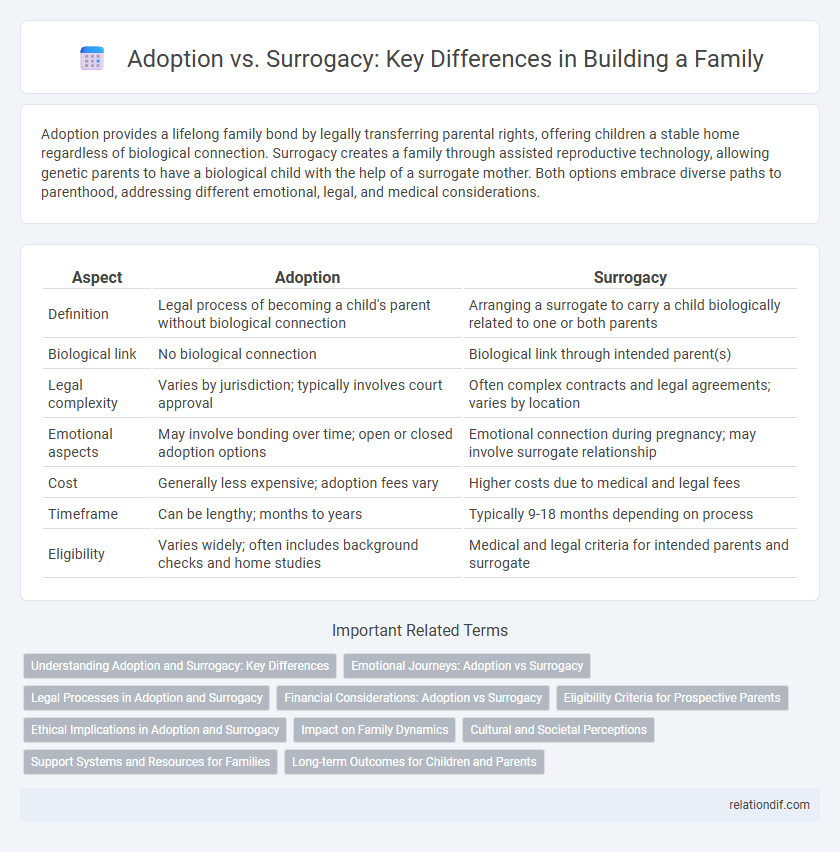Adoption provides a lifelong family bond by legally transferring parental rights, offering children a stable home regardless of biological connection. Surrogacy creates a family through assisted reproductive technology, allowing genetic parents to have a biological child with the help of a surrogate mother. Both options embrace diverse paths to parenthood, addressing different emotional, legal, and medical considerations.
Table of Comparison
| Aspect | Adoption | Surrogacy |
|---|---|---|
| Definition | Legal process of becoming a child's parent without biological connection | Arranging a surrogate to carry a child biologically related to one or both parents |
| Biological link | No biological connection | Biological link through intended parent(s) |
| Legal complexity | Varies by jurisdiction; typically involves court approval | Often complex contracts and legal agreements; varies by location |
| Emotional aspects | May involve bonding over time; open or closed adoption options | Emotional connection during pregnancy; may involve surrogate relationship |
| Cost | Generally less expensive; adoption fees vary | Higher costs due to medical and legal fees |
| Timeframe | Can be lengthy; months to years | Typically 9-18 months depending on process |
| Eligibility | Varies widely; often includes background checks and home studies | Medical and legal criteria for intended parents and surrogate |
Understanding Adoption and Surrogacy: Key Differences
Adoption involves legally assuming the parenting rights and responsibilities of a child not biologically related, whereas surrogacy entails a woman carrying and delivering a baby for another individual or couple, often using their genetic material. Adoption provides a permanent family connection to a child already born, while surrogacy facilitates the birth of a biologically related child for intended parents unable to conceive naturally. Understanding these distinct pathways is crucial for families considering options for expanding through adoption or surrogacy processes.
Emotional Journeys: Adoption vs Surrogacy
Emotional journeys in adoption often involve navigating feelings of loss, hope, and connection as adoptive parents build bonds with a child born outside their family. Surrogacy tends to present emotional complexities tied to the biological connection and shared pregnancy experience, alongside managing expectations and legal processes. Both paths require resilience, emotional support, and openness to forming deep familial love through unique experiences.
Legal Processes in Adoption and Surrogacy
Legal processes in adoption require thorough background checks, home studies, and court approvals to ensure the child's welfare and finalization of parental rights. Surrogacy laws vary significantly by jurisdiction, involving complex contracts outlining the rights and obligations of intended parents and the surrogate, often requiring judicial validation to establish legal parentage. Both pathways necessitate navigating detailed legal frameworks to protect all parties and secure parental custody.
Financial Considerations: Adoption vs Surrogacy
Adoption involves upfront costs such as legal fees, home studies, and agency charges, typically ranging from $20,000 to $50,000, depending on domestic or international options. Surrogacy, often exceeding $100,000, includes compensation for the surrogate, medical expenses, and legal fees, making it a substantially higher financial commitment. Families must evaluate insurance coverage, potential medical complications, and long-term financial planning when choosing between adoption and surrogacy.
Eligibility Criteria for Prospective Parents
Eligibility criteria for prospective parents differ significantly between adoption and surrogacy. Adoption requirements often include age limits, financial stability, and background checks to ensure a safe environment for the child. Surrogacy eligibility may require medical evaluations, legal agreements, and specific marital status or health conditions to qualify as intended parents.
Ethical Implications in Adoption and Surrogacy
Ethical implications in adoption involve ensuring the child's best interests, transparency in birth parent consent, and preventing exploitation or trafficking. Surrogacy raises concerns about the commodification of women's reproductive capacities, the surrogate's rights and wellbeing, and potential legal complications regarding parental rights. Both practices require robust legal frameworks and ethical guidelines to protect all parties, particularly the child's welfare and dignity.
Impact on Family Dynamics
Adoption introduces a child into a family who may bring diverse backgrounds and experiences, fostering unique bonding and challenges that influence family roles and relationships. Surrogacy often involves biological ties, which can affect emotional connections and legal complexities within the family structure. Both paths require careful navigation of identity, attachment, and communication to maintain healthy family dynamics.
Cultural and Societal Perceptions
Adoption is often viewed as a selfless act that broadens family diversity and is widely accepted across many cultures, while surrogacy can face ethical debates and legal restrictions due to differing societal norms. In Western societies, surrogacy is increasingly normalized as a viable path to parenthood, whereas in some cultures, biological connection remains paramount, sometimes leading to stigma around adoption. Cultural perceptions deeply influence the acceptance and regulation of both options, shaping the experiences of families who choose either route to parenthood.
Support Systems and Resources for Families
Adoption and surrogacy both require strong support systems, including counseling services, legal assistance, and community groups tailored to the unique needs of each family structure. Families pursuing adoption benefit from agencies offering post-placement support and access to adoptive parent networks, while surrogacy often involves specialized medical teams and legal advisors experienced in reproductive law. Access to these resources is vital for emotional well-being, informed decision-making, and fostering healthy family dynamics throughout the process.
Long-term Outcomes for Children and Parents
Studies show that both adoption and surrogacy lead to positive long-term outcomes for children, including strong emotional bonds and stable family environments. Parents in adoptive families and surrogacy arrangements often report high levels of satisfaction and well-being, with children demonstrating healthy psychological development. Research emphasizes the importance of supportive parenting, regardless of the family formation method, in ensuring successful lifelong experiences for all members.
adoption vs surrogacy Infographic

 relationdif.com
relationdif.com